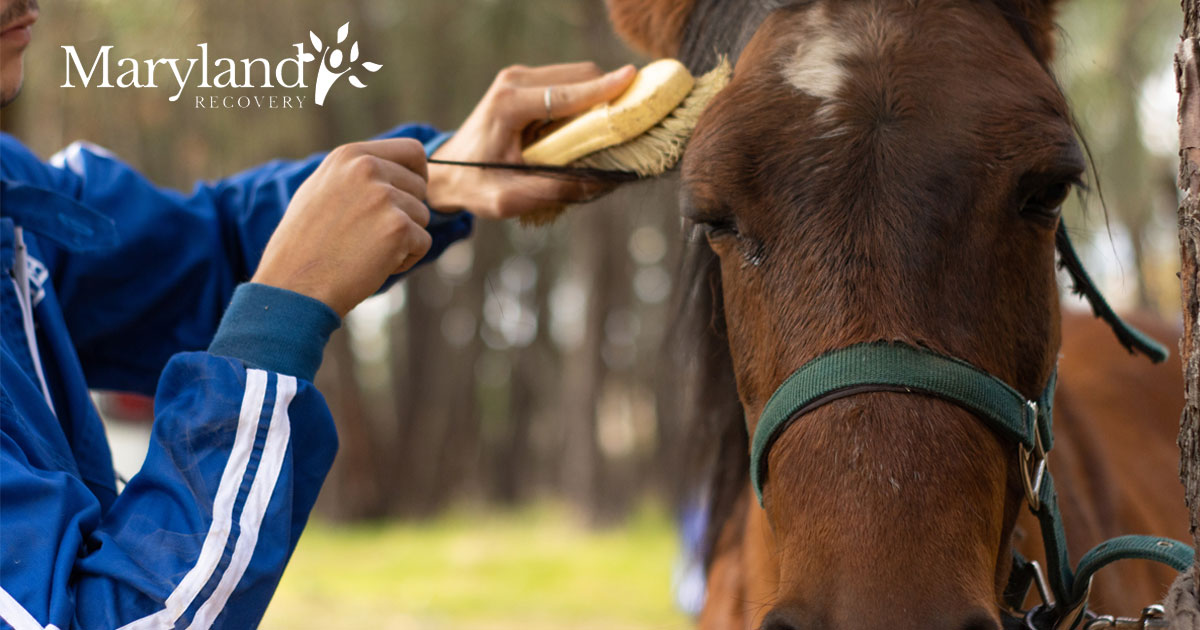
At Maryland Recovery, we wish to infuse happiness into the lives of our patients. In our equine therapy sessions (also known as animal-assisted therapy sessions), we use horses to help us work with our patients. We use equine therapy to break down barriers for our patients and warm them up to working with our staff and volunteers. We understand that most people don’t know the power of animal-assisted therapy, but horses actually make extremely good therapists.
As professional recovery experts, we understand that it is not always easy to interact with new people, so we utilize the power of equine therapy to bring comfort to those who may have difficulty with social interaction. Patients are encouraged to move at their own pace and make connections based on the goals they wish to achieve. We want to share the benefits of equine therapy with our patients to help them achieve successful treatment outcomes.
How Does Equine Therapy Help With Mental Health?
Equine-assisted therapy helps improve a person’s mental health, even reducing the adverse symptoms of several mental health disorders.[1]Yoo, J. H., Oh, Y., Jang, B., Song, J., Kim, J., Kim, S., Joung, Y. S. (2016). The effects of equine-assisted activities and therapy on resting-state brain function in attention-deficit/hyperactivity … Continue reading Equine therapy was born out of a deep concern for patient wellness and has grown into a truly transformational therapeutic tool used to treat various mental health issues. Today equine and other animal-assisted therapies can be seen in action in hospitals, schools, judicial courts, psychological therapy environments, and recovery programs. In terms of psychological therapy, horses are used to help patients adapt to new settings.
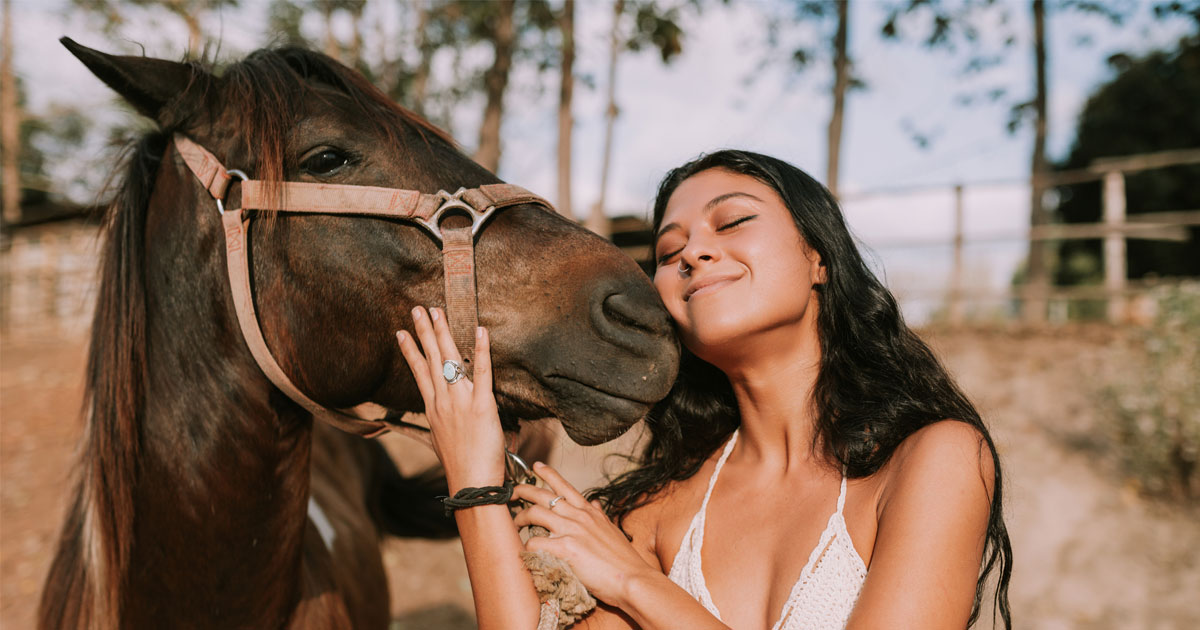
Animals have a very calming effect and can be beneficial in helping people to relax in therapeutic settings due to the unconditional acceptance that animals provide. From an emotional standpoint, horses and other animals used in therapy even help with nervousness and anxiety. The comfort animals provide has been shown to have noticeable positive effects on lower blood pressure in patients experiencing stress.
Horses are remarkably perceptive creatures who can tune into the emotions of human beings.[2]Wathan, J., Proops, L., Grounds, K., & McComb, K. (2016). Horses discriminate between facial expressions of conspecifics. Scientific Reports, 6, 38322. https://doi.org/10.1038/srep38322 For this reason, horses are incredibly effective for use in therapy. Horses have the ability to identify human facial expressions, so much so that they will choose to approach someone with a positive facial expression over someone who appears angry.
What Are the Different Types of Equine Therapy?
Several types of equine-assisted therapies exist and are currently being used to help people with mental health and addiction disorders. Each of these therapies works in a unique way to introduce horses to patients in engaging ways to promote bonding. The human-horse connection that is formed serves to move patients from a state of distress to a state of healing.
These are some of the most popular forms of equine-assisted therapy currently in use:
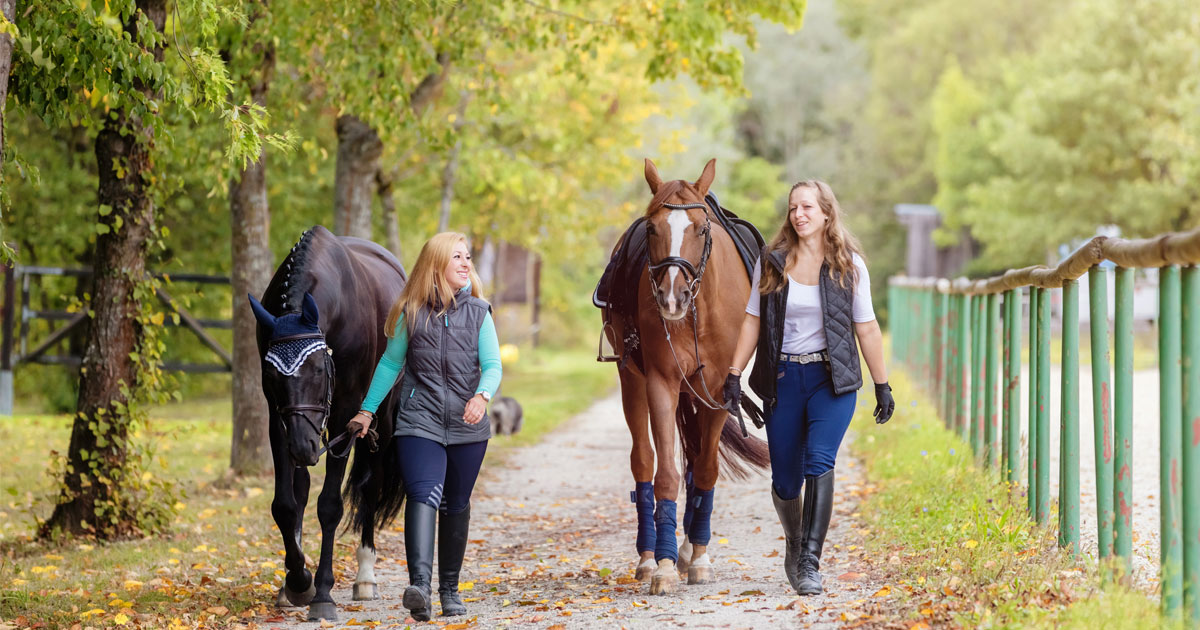
Equine-Facilitated Psychotherapy (EFP) or Equine-Assisted Psychotherapy (EAP)
- An experiential form of psychotherapy
- Based on therapeutic interactions with horses
- Used to assist people with emotional dysfunction
- Also used for psychological disorders (anxiety, depression, PTSD)
- Used for people undergoing difficult life transitions (divorce or death of a loved one)
Equine-Facilitated Learning / Equine-Assisted Learning
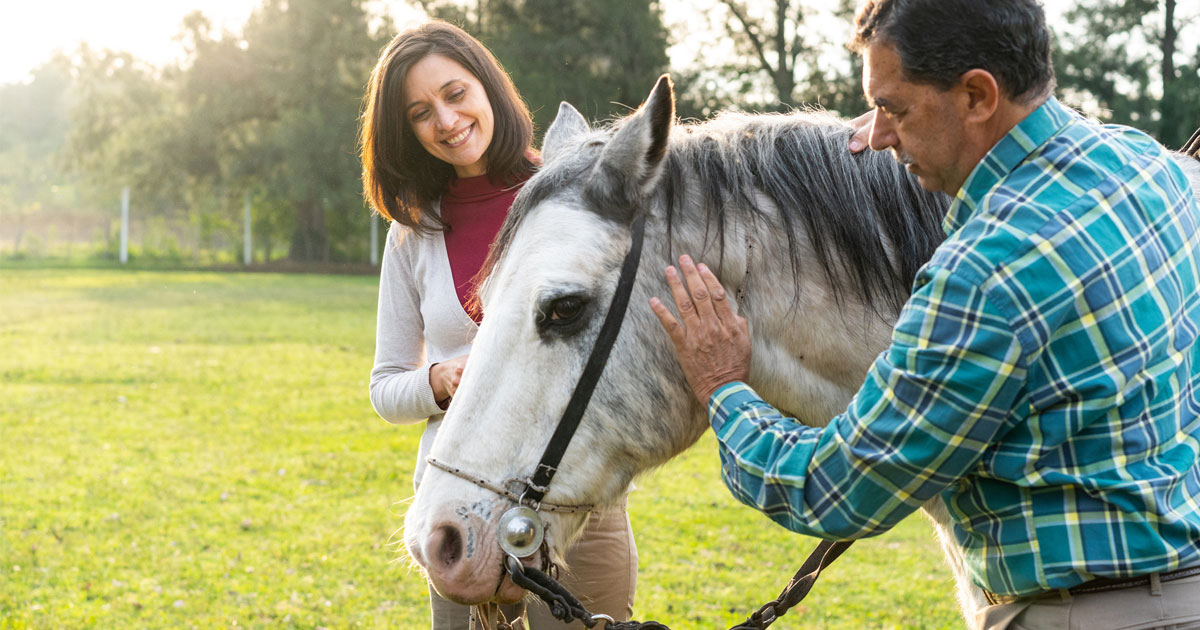
Equine-assisted learning therapy aims to help participants increase self-awareness and gain insight into their behavior. The focus on self-development helps people further their emotional and social interaction skills. Social interaction skills are life skills that are required to navigate the world in a productive way.
Equine-assisted learning is used to help people of all ages develop their relational skills in areas in a wide array of environments from classrooms to boardrooms. The curriculum for equine-assisted learning varies depending on the age and level of maturity of the patient, but the primary goal for all ages is to promote long-term emotional well-being.
Hippotherapy
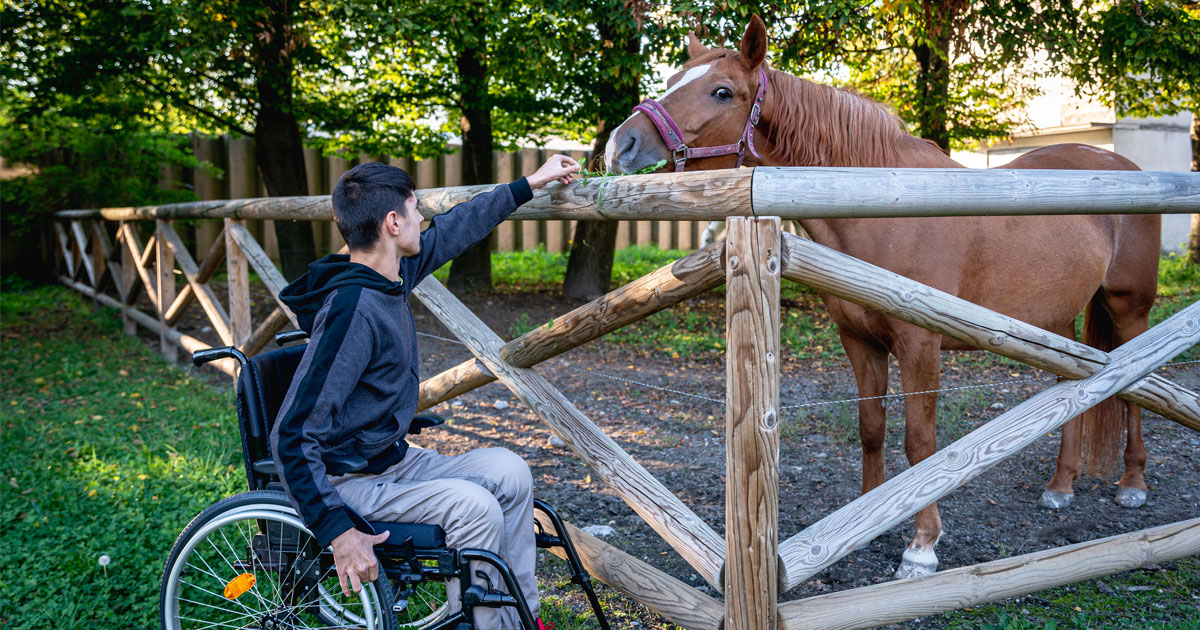
Hippotherapy is a form of therapy in which a licensed therapist uses the movements of a horse to provide patients with specific types of motor and sensory input. Hippotherapy is typically used in physical, occupational, or speech therapy.
During hippotherapy sessions, an equine specialist will encourage a horse through various cadences, tempos, and gaits while patients are instructed to use different postures, body language, and voice commands to guide the horse’s movements. Hippotherapy helps patients connect to their own bodies, improving sensory processes like motor coordination, and improving brain function. Hippotherapy benefits patients with neurological conditions like autism, Down syndrome, cerebral palsy, spinal cord injuries, and strokes.
Therapeutic Riding
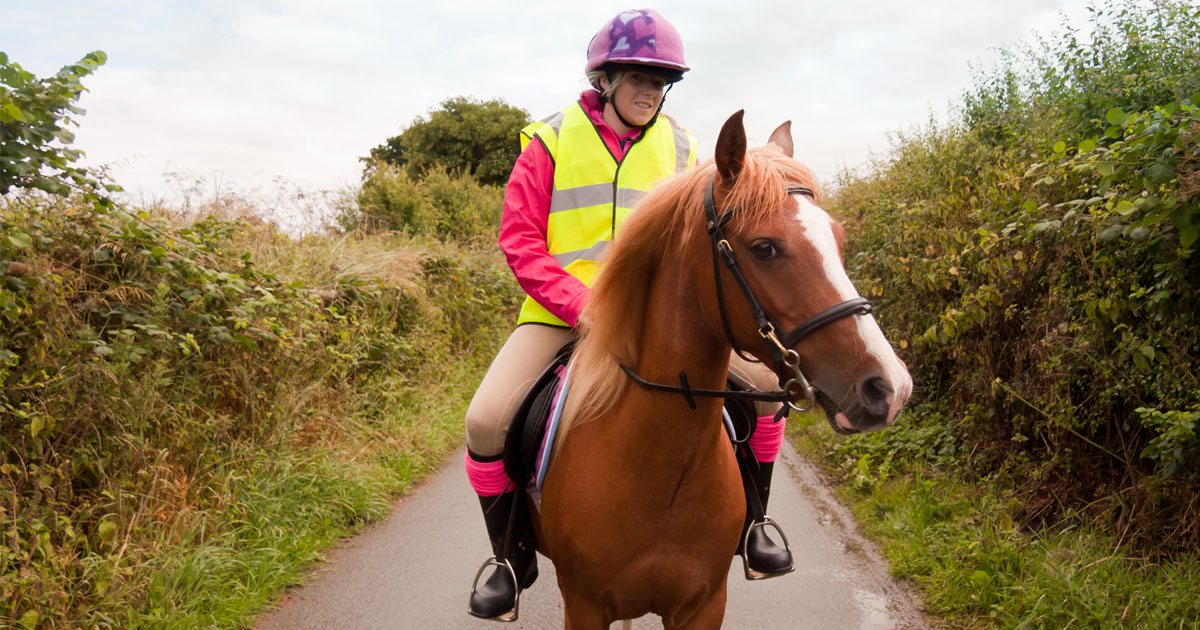
Therapeutic riding is a generally used term that describes the various riding activities specifically conducted by trained professionals for therapeutic purposes. Riding can improve the patient’s psychological and physical well-being. Therapeutic riding is typically provided by a riding instructor who collaborates with a hippotherapy specialist. Those with physical disabilities can use therapeutic riding as a means of improving flexibility, muscle strength, balance, and muscle tone.
Other forms of equine-assisted therapy involve activities such as grooming, vaulting, parade walks, equestrian shows, and demonstrations. Each of these activities uses interactions with horses to improve the quality of people’s lives.
Who Can Benefit From Equine Therapy?
Equine-assisted therapy is extremely beneficial to people who are seeking to regain control over their lives as they recover from substance use disorder. Many people who have fallen into a life of addiction have a very low level of self-confidence. People living life with low faith in themselves and their abilities often have a difficult time interacting with others. Untreated life difficulties often lead to the development of destructive coping behaviors like substance abuse.
Working with horses has the potential to help those in recovery understand how to relax, open up and gain control over their impulses. Equine-assisted therapy has also shown to have positive effects on people with disabilities that create issues with social interactions and impulse control.[3]Kozak, K., Lucatch, A. M., Lowe, D., Balodis, I. M., MacKillop, J., & George, T. P. (2019). The neurobiology of impulsivity and substance use disorders: implications for treatment. Annals of the … Continue reading
Equine-assisted therapies also help people in recovery who have a co-occurring disorder, such as:
- Depression
- Post-traumatic stress disorder
- Attention deficit hyperactivity disorder
- Anxiety
- Behavioral issues, including aggressive behavior
- Eating disorders, including anorexia and bulimia
- Relationship problems
- Communication issues
Equine-assisted therapy works very well as a part of an integrated treatment plan for people in need of treatment for co-occurring disorders.[4]Monfort Montolio, M., & Sancho-Pelluz, J. (2020). Animal-assisted therapy in the residential treatment of dual pathology. International journal of environmental research and public health, 17(1), … Continue reading Equine therapy can further strengthen existing models of integrated recovery treatment plans and improve success rates for addiction treatment programs.
How Effective Is Equine Therapy to Help With Recovery?
Equine-assisted therapy uniquely places focus on addressing the mental health challenges of people experiencing substance use disorder. Equine-assisted therapy is beneficial for patients in treatment, specifically those in need of alcohol, opiate, or cocaine addiction treatment.
Recent studies have shown the positive effects of animals in recovery settings for those struggling with substance use disorder. In these studies, the use of an animal in recovery treatment resulted in a decrease in impulsiveness, which is documented to be strongly associated with substance use disorders.[5]Marchand, W. R., Joubert, K., Smith, J., Nazarenko, E., Klinger, W., Sheppard, S., & Hoopes, K. H. (2022). A Pilot Observational Study of Implementing an Equine-Assisted Services Program Within a … Continue reading Impulsivity is described as the predisposition towards maladaptive, or risky behaviors relative to what is seen as normal behavioral responses to situations.
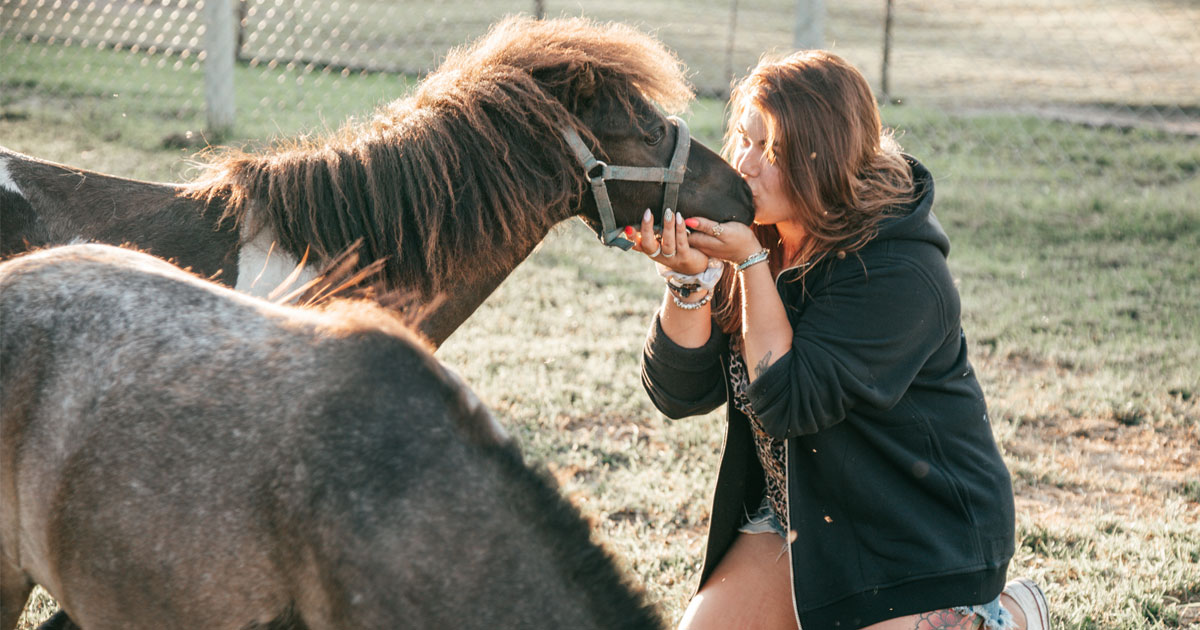
Much of the reason why people with addiction find it so hard to overcome their substance use disorder is that they lack the ability and/or knowledge to successfully cope with the stressors of their lives. Impulsivity combined with poor coping skills serves to perpetuate addiction, and without intervention, many people struggle with their addiction indefinitely.
When people suffering from substance use disorder participate in forms of animal-assisted therapy, they often find a sense of mental relief. The therapy helps them build resolve and feel a sense of empowerment as well as a sense of personal responsibility. Those who suffer from addiction often lack these positive feelings in their day-to-day lives, which leaves them susceptible to feelings of overwhelm and disempowerment. Thus, the cycle of addiction repeats itself over and over again.
What Skills Can You Build With Equine-Assisted Therapy?
Equine-assisted therapy is beneficial to those who require social support in therapy. It is especially helpful in helping those people build and improve their relationship skills. Through working with a horse to build trust, people learn the necessary skills to successfully manage themselves and their day-to-day interactions with others.
Relationship skills built through equine-assisted therapy include:
- Regulation of internal feelings
- Improved confidence and assertiveness
- Gaining an understanding of boundaries
- Becoming more resilient and focused
- Successfully learning important non-verbal communication skills
- Feeling needed
- A feeling of closeness and connection
- The ability to banish negative emotions
- Emotional growth and self-empowerment
- Relaxing and being mentally and emotionally present in the moment
- Overcoming limiting fears
- Developing trust
Why Are These Skills Necessary for Successful Recovery?
The recovery journey can be exciting, but at times the process can still feel stressful, overwhelming, and insurmountable. Therefore, building and maintaining strong, healthy relationships is a key element to substance abuse recovery. Equine-assisted therapy acts as a catalyst for relationship building by creating and fostering a sense of responsibility, belonging, and connectedness that can thwart isolation that often leads to relapse.
Healthy connections allow people to be authentic and vulnerable about their personal struggles. Important connections also help hold people in recovery accountable for the goals, boundaries, and values they set to overcome addiction. Strong, healthy relationships, including the one between a human and a therapy animal, can be game-changing when addiction challenges arise that test a person’s recovery efforts.[6]Scopa, C., Contalbrigo, L., Greco, A., Lanatà, A., Scilingo, E. P., Baragli, P. (2019). Emotional Transfer in Human-Horse Interaction: New Perspectives on Equine Assisted Interventions. Animals : An … Continue reading
The emotional transfer between a human and their horse acts to represent the backbone needed to sustain an obligatory relationship. The sense of duty developed can then be transferred to other areas of life making long-term sobriety possible.
Equine Therapy Sessions at Maryland Recovery
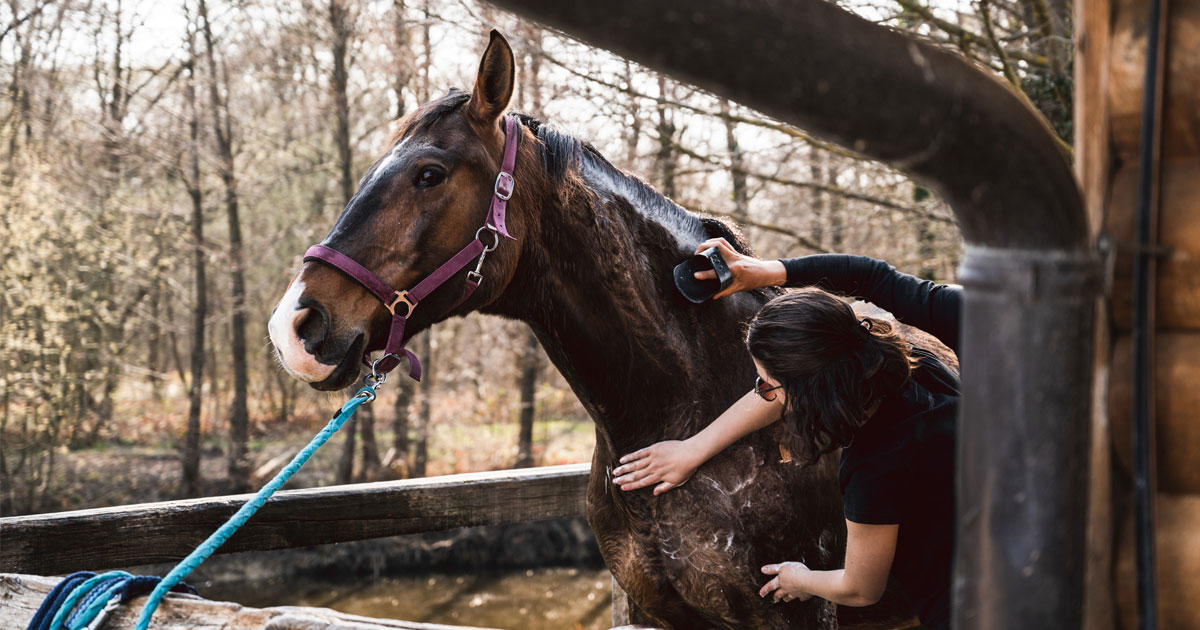
Making our patients feel at ease is a top priority for the therapists and staff at Maryland Recovery. We have developed our equine therapy sessions to support our more socially shy patients with resources that will help them experience therapy more comfortably and respond to treatment more positively. Our equine-assisted therapy programs are structured to facilitate emotional growth and mental health improvement for every patient in treatment for substance use disorders.
We understand the numerous benefits that animal-assisted therapies provide for patients in recovery. Our team of licensed therapists will work with you to create a unique recovery plan that will deliver success and moments of extreme comfort and joy. We can help you identify the origin of your substance use disorder and develop a recovery plan to help you succeed. Call (877) 958-9370 for a free consultation today. We’d love to help you.
Reviewed by Christopher Schwartfigure MS, LGPC, CAC-AD
References
| ↑1 | Yoo, J. H., Oh, Y., Jang, B., Song, J., Kim, J., Kim, S., Joung, Y. S. (2016). The effects of equine-assisted activities and therapy on resting-state brain function in attention-deficit/hyperactivity disorder: a pilot study. Clinical Psychopharmacology and Neuroscience, 14 (4), 357.https://doi.org/10.9758/cpn.2016.14.4.357 |
|---|---|
| ↑2 | Wathan, J., Proops, L., Grounds, K., & McComb, K. (2016). Horses discriminate between facial expressions of conspecifics. Scientific Reports, 6, 38322. https://doi.org/10.1038/srep38322 |
| ↑3 | Kozak, K., Lucatch, A. M., Lowe, D., Balodis, I. M., MacKillop, J., & George, T. P. (2019). The neurobiology of impulsivity and substance use disorders: implications for treatment. Annals of the New York Academy of Sciences, 145 1(1), 71–91. https://doi.org/10.1111/nyas.13977 |
| ↑4 | Monfort Montolio, M., & Sancho-Pelluz, J. (2020). Animal-assisted therapy in the residential treatment of dual pathology. International journal of environmental research and public health, 17(1), 120. https://doi.org/10.1093/milmed/usac028 |
| ↑5 | Marchand, W. R., Joubert, K., Smith, J., Nazarenko, E., Klinger, W., Sheppard, S., & Hoopes, K. H. (2022). A Pilot Observational Study of Implementing an Equine-Assisted Services Program Within a VA Medical Center Residential Substance Use Disorder Treatment Program. Military Medicine, USAC028. https://doi.org/10.1093/milmed/usac028 |
| ↑6 | Scopa, C., Contalbrigo, L., Greco, A., Lanatà, A., Scilingo, E. P., Baragli, P. (2019). Emotional Transfer in Human-Horse Interaction: New Perspectives on Equine Assisted Interventions. Animals : An Open Access Journal from MDPI, 9 (12), 1030.https://doi.org/10.3390/ani9121030 |








